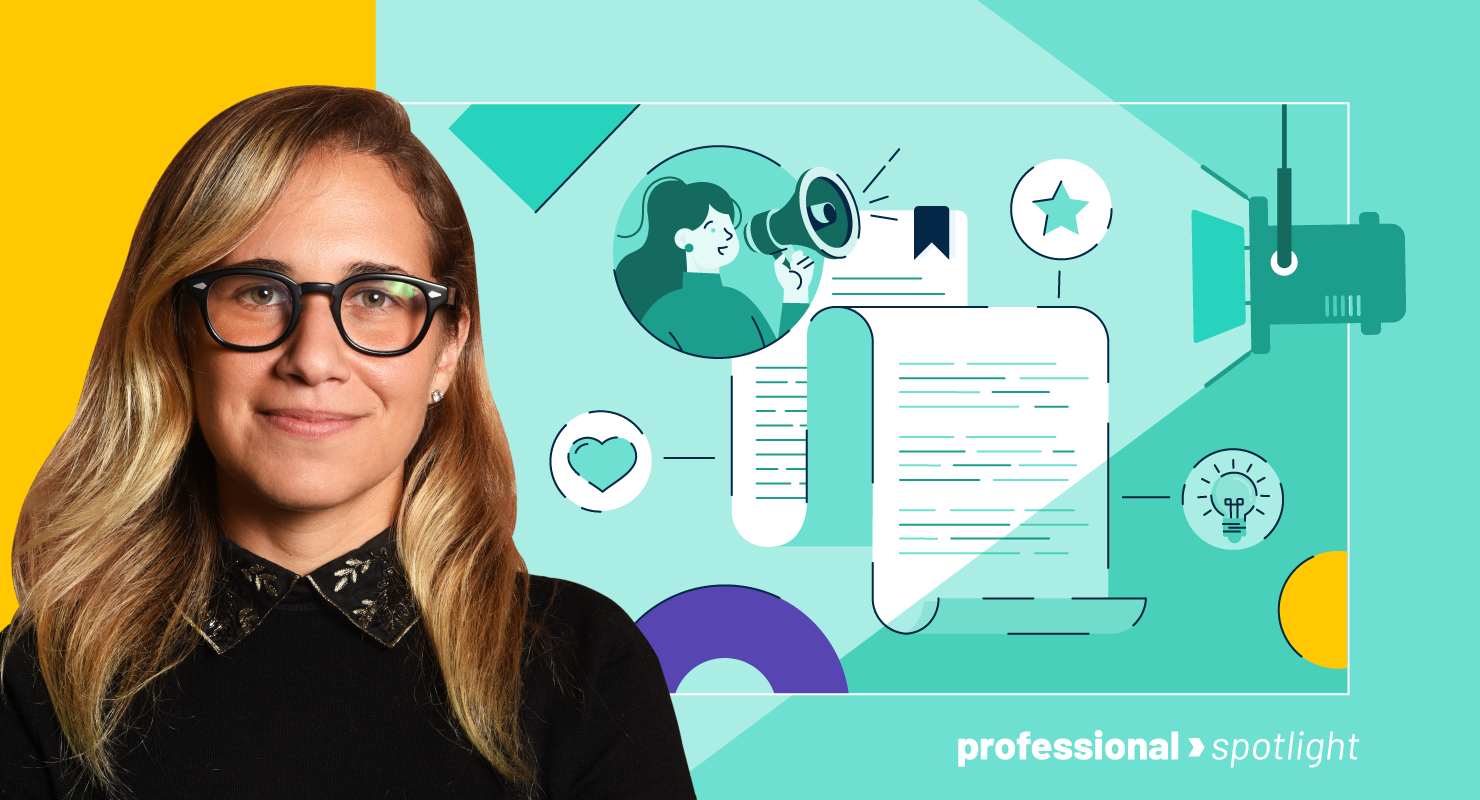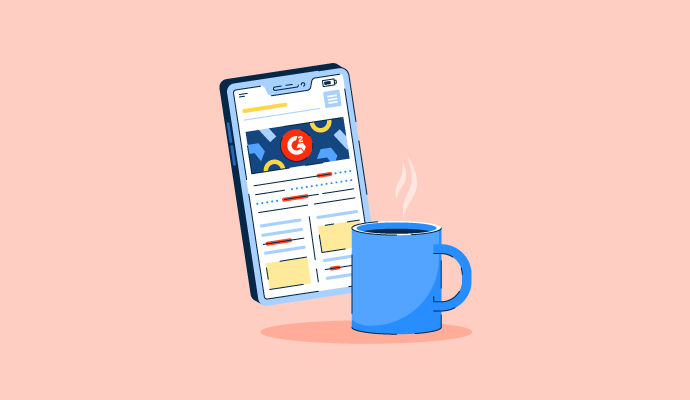November 13, 2024
 by Alexandra Vazquez / November 13, 2024
by Alexandra Vazquez / November 13, 2024

Let’s face it: the digital content space is as crowded as ever.
A brand’s success relies on more than just reaching its audience online. It requires earning their trust, staying relevant, and owning key conversations in the industry. But with the rapid changes happening in the world of content creation, especially with AI at play, the question remains: how can companies keep up and stand out authentically?
I chatted with Melissa Rosenthal, co-founder of Outlever and former CRO of Cheddar and CCO of ClickUp, to answer exactly that. With extensive experience in shaping brand credibility and customer trust, Melissa has a unique view on the critical need for companies to control their own narratives and empower themselves to become trusted voices in their industries.
To watch the full interview, check out the video below:
What’s your favorite beverage? Oh, my favorite beverage is coffee. I have this problem where if I'm getting low on coffee, I have to have another one even if the first one’s not completely done, and then I usually don't finish the old one. It's a bit of an issue because I have all these half-drank coffees in my fridge. But yes, coffee and espresso are my number one.
What was your first job? My first job was an internship at Buzzfeed, so it kind of parlayed itself pretty well into a big phase of my career. I went from being an intern to managing a 150-person team globally. I learned how and why people connect with content and what makes them take that extra step rather than just viewing something to share it with someone they know. It taught me fundamentally why people connect with things.
What are some of your best time management hacks? I love time-blocking. I think it's really important. I block out time for deep work on my own calendar, which I follow religiously.
What’s your favorite software in your current tech stack? ClickUp is the backbone of our entire company; everything goes through ClickUp. If it's not in ClickUp, it doesn't really exist. I don't think we could operate without a work management tool, and ClickUp is just really instrumental in everything we do.
Alexandra Vazquez: When we were prepping for this chat, you mentioned that the current sales motion is broken. Can you explain what that means to you and why you believe that is?
Melissa Rosenthal: I think that for a long time, when it came to cold outbound, sellers were pretty prescriptive and thoughtful with the right place, right message, and right time. And because people were not used to thoughtful cold outbound efforts, it worked.
Now, with AI, it's gotten to a new level where people are coming up with bizarre automated sequences. They're just leveraging AI research what this prospect last posted. But I've seen such wild things where someone was referencing someone's personal tragedy in an outbound email. And it was like, “Use our tool while you grieve.” The understanding of what personalization means is completely broken.
I also think hitting the right person at the right time through outbound is so hard. There's 364 days a year where they're not buying. So why don't we give them value? Why don't we provide value for them? Why don't we create a relationship with them and actually build something rather than trying to sell them immediately?
The future of what that motion looks like is much more relationship building, which is what it should have been from day one.
I’ve heard that a big part of building that relationship happens before you start the conversation. So, during that process of building brand perception, why do you think it's so important for companies to take ownership of the news and content they align with?
Being one of the earliest employees of Buzzfeed and then helping launch Cheddar, my goal was always to create compelling content that brands want to align themselves with and give a distinct voice to the market.
Transitioning to B2B SaaS, I saw firsthand how challenging it is for companies to reach their core customers efficiently at scale. So, what we're doing at Outlever is born out of the desire to solve that problem. We want companies to be able to become that authority in their space and create content that matters both to them and their customers at scale.

Keep up with what’s really going down in marketing with the G2 Tea newsletter. Subscribe here
How do you enter the conversations that your customers are having? How do you create value for them? Not just bottom-of-the-funnel, high-intent blog content, but really creating that trusted voice and giving them a platform to elevate them. I think creating such a voice is really important because that's something that can't be taken away from you when you start to build the IP yourself.
Taking ownership of something and building it into the core motion of what you are as a company, what you stand for, and who you elevate is core to what gives a company credibility, what it speaks to, and what its customers care about.
You mentioned Cheddar and previously mentioned ClickUp. Those were two really big roles in your career that I would love to touch on. You were the CRO of Cheddar and the CCO of ClickUp. How did your experiences building those brands influence your approach to co-founding Outlever?
At Cheddar, we were specifically building very high caliber content with executives from tech and media companies to create a credible, trusted voice.
At ClickUp, we grew very fast. We had a very large marketing budget, and we were able to do a lot of really great things. We had a great billboard strategy, a very robust SEO strategy, and everything you can imagine in performance marketing. We were able to build the brand through these channels. But a lot of that is paid and diminishes over time.
It's when you're not spending millions of dollars where you start to lose that traction. So I thought, "I wish I had something where we owned it 24/7." It's really challenging to create demand, build a brand, and do all these things efficiently and scalably over time. It becomes more valuable when it doesn't diminish over time because you're not putting the same money into the machine. It just grows in value and credibility.
So, I wanted to build Outlever and make something that could stand the test of time and become a core value and core asset for a company, helping them build their brand, create demand, and rethink their outbound strategy.
I did some research on Outlever and learned a lot about your mission — to help brands be the number one news source in their industry. How does Outlever help B2B companies make sure they're having the conversations that matter most to customers?
What we've built is this really strong media listening algorithm that listens to hundreds of millions of signals a day across everything: LinkedIn, podcasts, Reddit, the corners of the Internet where you might not think people are having conversations, but they are. And with that, we've been able to align the customers that we have with the stories and signals that their customers are already talking about.
We call it account-based media. So, we're thinking about who the ideal customer profiles are. What are they talking about? How do we feed them valuable content to elevate thought leadership? How do we get people talking in the space?
There's no reason why you, as a company, shouldn’t amplify the things that your customers care about, like what's happening in their industry.
AI is top of mind for all industries. How do you see automation playing a role in the future of editorial content?
Well, the media listening algorithm that we use at Outlever is powered by AI. It is how we analyze this data so quickly and parse it to understand signals. It could not be done without AI, so it's definitely fundamental.
It's starting to reason with itself, and that's something we haven't seen before. It's pretty amazing how it makes decisions. It is starting to think like a journalist, which is wild to me. If we're here now, the future is really bright.
I think we're at a really interesting crux in content creation and where AI can take it.
There's a lot of trepidation and skepticism about AI-driven content, but what we're seeing on our end is really promising.
I think a lot of customers have made it very clear that they have certain expectations for brands and their transparency when it comes to AI. How do you foresee those expectations changing in the future? How do companies like Outlever help clients navigate that environment?
That's honestly the first question on every call: what is the role of AI, and how do you maintain quality? The goal of AI is to make our journalists way more efficient. That's how we view it right now. We're very transparent that AI is just the first draft, and then it's human from there.
Over time, there will be people who are skeptical about it and don't see what we're seeing on our end. As we progress, it's going to get really hard to tell whether a journalist or AI wrote it, and maybe in a good way. When AI isn't jumping the shark and making crazy errors and using the same word five times, you're going to start not really being able to tell the difference. Every industry is kind of grappling with that. How do you add a human perspective? The thing that you can't change and you can't take away is the human perspective.
That's really what we lean into after we generate an article. Whether AI wrote the news or a person wrote the news, it needs to be short form. That's how I believe people consume content. I don't necessarily want to read a 5,000-word article unless it's something really deep on a topic I really care about. Otherwise, I just want these questions answered: what do I need to know right now? Why does it matter to me? What is the perspective of the person that I'm looking to? That's where we think there's that opportunity to mix human intelligence and perspective with machine and AI.
You've had such a solid career, and I'm sure you've learned so much. If you could give any advice to somebody who is earlier in their career in content marketing, what are some things that you would tell them to keep in mind?
Keep a pulse on the future. If things stay stagnant for too long, you're probably not headed in the right direction.
Trust your gut. If you keep seeing something and there's repetition and patterns, trust yourself. There have been many times when I looked to people I thought were visionaries because I believed they must know better. Maybe the idea of imposter syndrome is less about feeling like you don’t belong and more that you can't trust yourself.
The more that you trust yourself, the more that feeling goes away, especially when you are right more times than you're not. So I would say to start thinking about the patterns that you see, trust those patterns, and question things. I wish I had questioned things more often.
That really led me to why I created what I created now. This is the culmination of a lot of questions I've been asking myself that have had no solution.
I felt like this should be the future of outbound. How do we bring all these things together? I needed to solve this because no one else was doing it and no one else saw it the way I did.
Watch the full chat on YouTube and subscribe to G2 Tea, our SaaS-y newsletter with tech insights and tidbits from industry professionals like Melissa!
Follow Melissa Rosenthal on Linkedin to learn more about her journey with Outlever as they work to help transform brands into the #1 news source in their industry.
Alexandra Vazquez is a former Senior Content Marketing Specialist at G2. She received her Business Administration degree from Florida International University and is a published playwright. Alexandra's expertise lies in copywriting for the G2 Tea newsletter, interviewing experts in the Industry Insights blog and video series, and leading our internal thought leadership blog series, G2 Voices. In her spare time, she enjoys collecting board games, playing karaoke, and watching trashy reality TV.
There's a quiet revolution happening in the digital world, and it's being led by people with...
 by Tanushree Verma
by Tanushree Verma
Picture this: It's 2025. Your marketing intern used an AI tool to generate content for your...
 by Tanushree Verma
by Tanushree Verma
What if I told you that every time you drive by a billboard, you are an active participant in...
 by Alexandra Vazquez
by Alexandra Vazquez
There's a quiet revolution happening in the digital world, and it's being led by people with...
 by Tanushree Verma
by Tanushree Verma
Picture this: It's 2025. Your marketing intern used an AI tool to generate content for your...
 by Tanushree Verma
by Tanushree Verma


